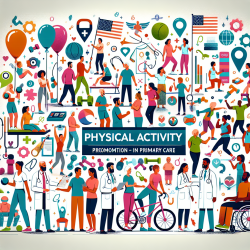At TinyEYE, we are committed to providing exceptional online therapy services to schools, ensuring that every student receives the support they need. Our mission is to empower practitioners with the tools and knowledge to enhance their skills continually. In line with this, we draw insights from various research studies, including those outside the direct realm of therapy, to offer innovative approaches and solutions.
One such study, titled Profile of Self-Reported Physical Tasks and Physical Training in Brazilian Special Operations Units: A Web-Based Cross-Sectional Study, provides valuable insights that can be adapted to improve the effectiveness of online therapy services, particularly in special education.
Key Findings and Their Relevance to Online Therapy
The study explored the physical tasks and training regimes of Brazilian Special Operations Units (SOPUs), focusing on the frequency, difficulty, and importance of these tasks. The findings highlighted the need for structured, supervised, and planned physical training programs to enhance operational fitness. While the context differs, the principles of structured and supervised training can be effectively applied to online therapy.
Structured Training Programs
The research emphasizes the importance of structured training programs. In the context of online therapy, this translates to having a well-defined framework for therapy sessions. Structured programs ensure consistency and provide a clear roadmap for both therapists and students. Here’s how you can implement structured programs:
- Develop Comprehensive Session Plans: Create detailed plans for each therapy session, outlining objectives, activities, and expected outcomes.
- Use Evidence-Based Practices: Incorporate techniques and interventions that are backed by research to ensure effectiveness.
- Regular Assessments: Conduct periodic assessments to monitor progress and adjust the therapy plan as needed.
Supervised Training and Collaboration
The study found that physical training without supervision was less effective. Similarly, in online therapy, supervision and collaboration can significantly enhance the quality of services. Consider the following strategies:
- Peer Review and Feedback: Encourage therapists to review each other’s sessions and provide constructive feedback.
- Mentorship Programs: Establish mentorship programs where experienced therapists guide and support less experienced colleagues.
- Collaborative Planning: Foster a collaborative environment where therapists can share ideas and co-develop therapy plans.
Autonomous and Directed Planning
The research highlighted a blend of autonomous and directed planning in training programs. For online therapy, this means allowing therapists the flexibility to adapt their sessions while following a general framework. Here’s how to balance autonomy and direction:
- Guidelines and Flexibility: Provide clear guidelines for therapy sessions but allow therapists the freedom to adapt based on the individual needs of students.
- Personalized Approaches: Encourage therapists to personalize their approach, considering the unique strengths and challenges of each student.
- Continuous Professional Development: Offer opportunities for therapists to engage in ongoing professional development to enhance their skills and knowledge.
Encouraging Further Research and Continuous Improvement
As practitioners, it’s essential to stay informed about the latest research and continually seek ways to improve. Here are some steps to encourage further research and continuous improvement:
- Stay Updated: Regularly read research articles and attend conferences or webinars related to online therapy and special education.
- Participate in Research: Engage in research studies or collaborate with academic institutions to contribute to the body of knowledge in the field.
- Reflect and Adapt: Reflect on your practice, seek feedback, and be willing to adapt based on new insights and evidence.
By integrating the principles from the research on Brazilian Special Operations Units into your practice, you can enhance the effectiveness of online therapy services, ultimately benefiting the students you support.
To read the original research paper, please follow this link: Profile of Self-Reported Physical Tasks and Physical Training in Brazilian Special Operations Units: A Web-Based Cross-Sectional Study.










